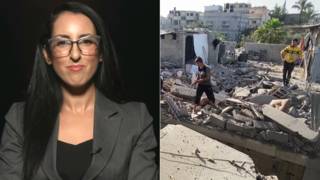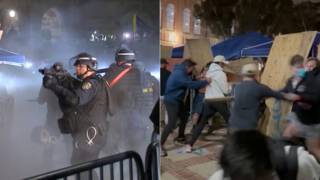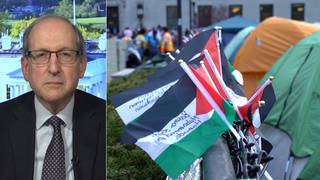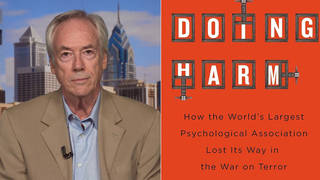
Related
Topics
The Supreme Court agreed yesterday to decide whether prisoners at Guantanamo Bay are entitled to access to civilian courts to challenge their open-ended detention. We speak with Michael Ratner of the Center for Constitutional Rights. [Includes transcript]
Click here to read to full transcript The Supreme Court agreed yesterday to decide whether prisoners at a U.S. military prison in Guantanamo Bay are entitled to access to civilian courts to challenge their open-ended detention.
It is the first time the justices will decide a case on the Bush administration’s anti-terrorism policy. The New York Times describes the decision as “an unmistakable rebuff” of the Bush administration’s position. The U.S. considers the detainees enemy combatants, not prisoners of war who are entitled to specific protections under international law.
The court said it would resolve only the jurisdictional question of whether the federal courts can hear such a challenge and not whether these detentions are in fact unconstitutional.
The appeals were made by a group of 16 detainees–including two British, two Australians and 12 Kuwaitis–held for more than 18 months without access to their families or to lawyers, and held without any charges brought against them. They are among about 660 detainees from more than 40 nations held at the U.S. Navy base in Cuba following their capture during the war in Afghanistan.
- Michael Ratner, president, Center for Constitutional Rights.
TRANSCRIPT
AMY GOODMAN: Michael Ratner is one of their attorneys. He is president of the Center for Constitutional Rights in New York. Welcome to Democracy Now!, Michael.
MICHAEL RATNER: Nice to see you, Amy.
AMY GOODMAN: So, talk about the significance of this decision.
MICHAEL RATNER: Well, we were very exited about it because you have to understand, the government won in the District Court and in won in the Court of Appeals on the theory that the executive could do whatever it wanted with whomever it wanted at Guantanamo Bay and that the courts should play no role whatsoever. So, the fact that the Supreme Court stepped in here and said, no, we want to at least consider the question of whether courts can hear whether the rights of the people at Guantanamo Bay have been violated is a very, very significant ruling. Look, we’re not home at all by this ruling in a long way, but it is I think a real blow to the Bush administration to have the Supreme Court step in here.
AMY GOODMAN: The court said it would only resolve the jurisdictional question of whether the federal courts can hear such challenge, not whether these detentions are unconstitutional. Can you explain what that means?
MICHAEL RATNER: Right. What that means is, the government has asserted because the people on Guantanamo Bay in the government’s view, outside the United States that no court in the United States can hear any of the cases, that you can go into a court, but the court will just throw you out, because the U.S. courts have no jurisdiction over Guantanamo. What the Supreme Court is saying is, no, we’re going to look at that question, can a U.S. court hear what’s happening in Guantanamo Bay. We had a similar situation with the Haitian refugees in 1991. We did get the Second Circuit Court of Appeals to say, yes, we can look at what’s happening with the Haitians in Guantanamo. What they have done is, they said we might take jurisdiction of the case and say courts can hear it, but we are not going to decide whether holding people without a hearing is necessarily constitutional or not. We’re going to say there might be jurisdiction, but we’re probably going to send that back to a lower court to decide whether or not there’s a violation of the constitution.
AMY GOODMAN: Tell us about your clients. Who are these men?
MICHAEL RATNER: That’s a variety of people there, obviously. There’s 660. We have — I represent personally along with the center and some other lawyers four: Two people from Australia and two people from the United Kingdom. They were people picked up, according to the government, again, we don’t know, in Pakistan and in Afghanistan. The government has claims about them, but has really not asserted what they did wrong other than possibly some of them may have fought with the Taliban. Some of them were civilians picked newspaper Pakistan. The 12 Kuwaitis were apparently all in Pakistan and all civilians. The answer is we have never had access to them. They don’t know that I represent them. I represent their families. They don’t get to see their attorney, any of their families, they’re held incommunicado. I only know what the government tells me and it’s very, very slim.
AMY GOODMAN: We had you on when we had the father of the Australian detainee, David Hicks, on. He had come to New York and stood in a cage outside your offices in an orange jumpsuit to show what it was like. He said he has retraced his son’s steps in Afghanistan, even interviewed the commander of the base, the Afghan commander of the base, who said that his son would not have been taken if he had been there at the time.
MICHAEL RATNER: Right. I mean, David Hicks’ father is a wonderful man. He built this cage on Broadway, stood in it in a jumpsuit for two hours. He is not a Muslim himself, his son converted to Muslim. But he’s supportive of his son. He says, look, my son deserves to have some kind of a hearing as to whether he should be kept there. He has been there almost two years now and why no hearing? And why was he picked up? A lot of people were picked up because the U.S. was bribing people, was saying to people, point us, who are to the leaders of Al Qaeda, point them out. Well, someone gets whatever the bribes were, and they say they identified their enemy. That’s actually a lot of the people here are probably innocent of everything, much less, you know, just say they fought on behalf of the Taliban. That doesn’t make them into war criminals if they fought on behalf of the Taliban. We may not like what they did but that doesn’t make them incarcerated in Guantanamo.
AMY GOODMAN: We’re talking to Michael Ratner, president of the Center for Constitutional Rights about the ruling of the Supreme Court to the surprise of many, agreeing to decide whether prisoners at the U.S. military prison in Guantanamo Bay are entitled to access to civilian courts to challenge their open-ended detention. What does this mean for prisoners like Jose Padilla?
MICHAEL RATNER: I think it’s significant for people like Jose Padilla because the court is willing to review whether or not people in Guantanamo have some rights. People like Jose Padilla who are here in the United Stated and given more rights because they’re U.S. citizens should be given substantial rights. Padilla of course does have a case in court.
AMY GOODMAN: He is an American citizen who is labeled an enemy combatant.
MICHAEL RATNER: Right. Padilla is the so-called dirty bomber. I hate — I hesitate to use that word, because they never came up with any evidence about that. That’s what they call him. Hi is in an American court. He has never been given access to an attorney. He did get to bring a writ of habeas corpus in an American court and his case is going to be argued soon in the Second Circuit Court in New York. But is does seem to me that the court stepping in the Guantanamo Bay cases is a real warning sign to courts deciding these enemy combatant cases in the United States. It’s saying, look, be careful here. You are dealing with real human beings and real right. You can’t just ignore them when the Bush administration says this is the Commander in Chief Power, we can do whatever we want. The court is basically setting up a red flag, you can’t do whatever you want. So it’s very significant that the court stepped in here.











Media Options